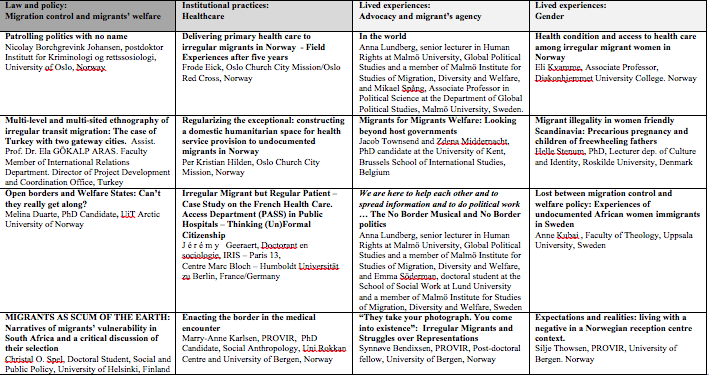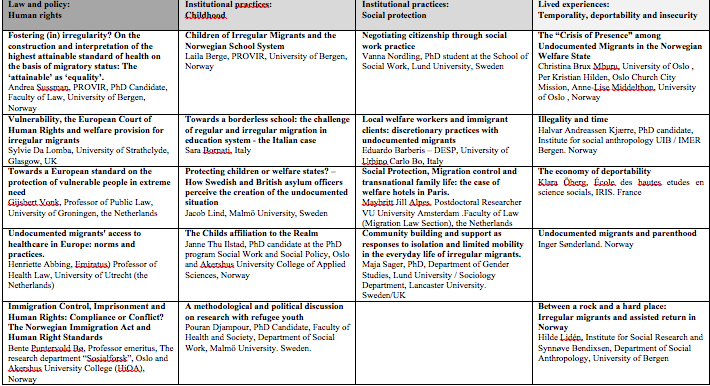Closing conference PROVIR
“Exceptional welfare: Dilemmas in/of irregular migration”
How do states respond to the physical presence and needs of people it officially has excluded? To what extent do international human rights provide protection? How does migration control and welfare policy affect irregular migrants’ experiences and subjectivities?
Physically present, but legally excluded, irregular migrants’ present societies with particular dilemmas relating to both sovereignty and human suffering. European countries increasingly involve welfare services in migration control, either by restricting access, or by using welfare services to detect/expose irregular migrants. This raises important questions concerning not only how migrants’ legal status influences their capacity to access services, but also the practical and ethical implications for service providers. Furthermore, it challenges the extent to which human rights actually limit the exclusionary powers of states and as such whether human rights are viable outside the confines of citizenship.
Provision of Welfare to Irregular Migrants (PROVIR) will be organizing its closing conference at the University of Bergen, 19th – 21th of November 2014. As an interdisciplinary project, the PROVIR research group and its international partners have combined a legal and social science approach to the provision of welfare to ‘irregular migrants’ in Norway, and comparatively in Europe, looking particularly at health care and education. The aim of the project has been to investigate the complex relationship between law, institutional practice, and migrants’ lived experience.
The closing conference aims to bring together researchers from various disciplines who are interested in the interplay between migration control and welfare policy. At the conference, findings from the PROVIR-project will be presented by the research team. In addition to presentations by key note speakers, the PROVIR research team also welcomes papers to be presented at workshops. We especially invite contributions addressing:
1) Irregular migrants’ legal situation regarding access to welfare provisions, either in national or international law.
2) Institutional practices and responses by service providers.
3) Migrants’ experiences, agency and embodiment.
We welcome both theoretical and empirical ventures into these questions, and papers may combine the aforementioned issues with interdisciplinary approaches. We particularly encourage papers exploring issues related to health, education and children. Paper proposals (maximum 300 words) can be submitted until the 25th of April 2014. Please include a short bio with the abstract. Conference registration deadline is 1st of October.
More information about the PROVIR-project is available at http://rokkan.uni.no/sites/provir/
IMER Seminar:
Elaine Chase and Jenny Allsopp: The ‘tactics’ of time and status: Young people subject to immigration control making the transition to ‘adulthood’ in the UK
Young people who arrive in the UK from outside Europe without a parent or legal guardian are institutionally categorised according to a range of possible legal statuses and usually afforded time-limited Leave to Remain in the UK. These categorisations are associated with specific welfare entitlements which tend to diminish over time and become particularly uncertain as young people transition into ‘adulthood’. Situated within a broader research programme examining the link between migration, ‘wellbeing’ and ‘futures’, this paper examines the multiple transitions imposed on young people subject to immigration control as they approach the age of 18 and beyond, (from child to ‘adult’, from being accorded a temporary residence permit to more permanent leave to remain or from legality to ‘illegality’) and the implications for their access to various dimensions of welfare provision. The paper shows how different components of the ‘state’ have time limitations at their disposal to control access to welfare and state support according to chronological age. From young people’s perspectives, such ‘tactics’ fundamentally control their trajectories and future prospects unless they can formulate strategies of their own to counter such tactics.
Read more about Elaine Chase here
Read more about Jenny Allsopp here
PROVIR closing conference: Registration deadline 01.10.2014:
Conference registration deadline is 1st of October. Send abstract and registration details to Marry-Anne.Karlsen@uni.noMore information about the PROVIR-project is available at http://rokkan.uni.no/sites/provir/ To register and pay registration fee, please use the following link: https://provir.hoopla.no/sales/#1609368930/
Closing conference PROVIR: “Exceptional welfare: Dilemmas in/of irregular migration”
How do states respond to the physical presence and needs of people it officially has excluded? To what extent do international human rights provide protection? How does migration control and welfare policy affect irregular migrants’ experiences and subjectivities?Physically present, but legally excluded, irregular migrants’ present societies with particular dilemmas relating to both sovereignty and human suffering. European countries increasingly involve welfare services in migration control, either by restricting access, or by using welfare services to detect/expose irregular migrants. This raises important questions concerning not only how migrants’ legal status influences their capacity to access services, but also the practical and ethical implications for service providers. Furthermore, it challenges the extent to which human rights actually limit the exclusionary powers of states and as such whether human rights are viable outside the confines of citizenship.
Provision of Welfare to Irregular Migrants (PROVIR) will be organizing its closing conference at the University of Bergen, 19th – 21th of November 2014. As an interdisciplinary project, the PROVIR research group and its international partners have combined a legal and social science approach to the provision of welfare to ‘irregular migrants’ in Norway, and comparatively in Europe, looking particularly at health care and education. The aim of the project has been to investigate the complex relationship between law, institutional practice, and migrants’ lived experience.
The closing conference aims to bring together researchers from various disciplines who are interested in the interplay between migration control and welfare policy. At the conference, findings from the PROVIR-project will be presented by the research team. In addition to presentations by key note speakers, the PROVIR research team also welcomes papers to be presented at workshops. The topics adressed will be:
- Irregular migrants’ legal situation regarding access to welfare provisions, either in national or international law.
- Institutional practices and responses by service providers.
- Migrants’ experiences, agency and embodiment.
PROGRAM:
Wednesday 19th of November Venue: Det Akademiske Kvarter
18.00-19.30: Letter to the king Film by Hisham Zaman
Letter to the King portrays five people on a day trip from a refugee camp to Oslo, a welcome change in an otherwise monotonous life. But we soon realize that each and every one of them has an agenda for their trip. All five will make decisive choices on this day, as they discover happiness, humiliation, love or fulfill a long-awaited revenge. The five stories are tied together by a letter, written by eighty-three year old Mirza. Mirza wants to hand over the letter to the King personally.
19.30-21.00: Mediating irregular migration
The phenomenon of irregular migration is inextricably linked to its forms of mediation. Researchers, artists, authors, journalists and others contribute to the proliferation of images of the lives, and deaths, of those who migrate without proper authorization from the state. While stereotypical accounts of victims/criminals proliferate in mainstream media – (counter) representations that challenge such stereotyping also exist. The speakers in this panel discussion have all participated in producing and/or analysing images of irregular migration. Taking as their point of departure the film “Letter to the King”, they will discuss the poetics and politics of mediating irregular migration. What (im)possibilities does such mediation offer for current border struggles?
Plenary panel discussion with:
Hisham Zaman, Director (To be confirmed)
Shahram Khosravi, Associate Professor of Social Anthropology, University of Stockholm
Synnøve N. Bendixsen, Post-doctoral fellow PROVIR and Department of Social Anthropology, University of Bergen
Film and panel discussion organized in cooperation with Studentersamfunnet i Bergen (http://samfunnet.sib.no/)
Thursday 20th of November Venue: Faculty of Law, Magnus Lagabøtes plass 1, University of Bergen
09.30-10.00: Tea, coffee and registrations
10.00-10.15: Welcome address
10.15-11.45: Precarious inclusion: Provision of welfare to irregular migrants in Norway
Presentation of PROVIR research findings by
Christine M. Jacobsen, Karl Harald Søvig, Synnøve Bendixsen, Andrea Sussman and Marry-Anne Karlsen
11.45-12.00: Coffee break
12.00-13.00: Care Beyond Welfare?
Key note lecture by Miriam Ticktin, Associate Professor of Anthropology, The New School for Social Research and Eugene Lang College (US)
13.00-14.00: Lunch
14.00-16.00: Workshops
16.00-16.15: Coffee break
16.15-17.15: Wrongs, Rights and Regularization
Key note lecture by Linda Bosniak, Distinguished Professor of Law, Rutgers School of Law–Camden (US)
19.00: Conference dinner
Nøsteboden
Friday 21st of November
Venue: Faculty of Law, Magnus Lagabøtes plass 1, University of Bergen
09.15-10.15: Limiting Health Care as a Tool of Immigration Policy: Ethnographic Insights into Deservingness and Responses by Civil Society
Key note lecture by Heide Castañeda, Associate Professor and Graduate Director, Department of Anthropology, University of South Florida (US)
10.15-10.30: Coffee break
10.30-13.00: Workshops
13.00-14.00: Lunch
14.00-16.00: Excepted, excluded or precariously included? Dilemmas in/of irregular migration Roundtable discussion by PROVIR research team and international partners:
Bridget Anderson, Professor of Migration and Citizenship and Deputy Director of Centre on Migration, Policy and Society (COMPAS), University of Oxford (UK)
Milena Chimienti, Professor, University of Applied Science Western Switzerland – Social Work, Haute Ecole Fribourgeoise de Travail Social (HETS) (Switzerland)
Henriette Abbing, (Emiratus) Professor of Health Law, University of Utrecht (the Netherlands)
Christine M. Jacobsen, Professor, PROVIR project leader and Director of Center for Women’s and Gender Research (SKOK), University of Bergen (Norway)
Karl Harald Søvig, Professor, Faculty of Law, University of Bergen (Norway)
Workshop Porgram:
Download workshop program here
Katrine Mellingen Bjerke – Elderly migrants in Norway
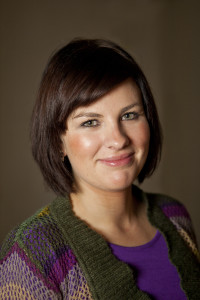 Aging of the population raises a series of different challenges for the Norwegian elderly care system. One of the challenges is related to user differentiation, that is, the understanding that services should be adapted to each user’s individual needs. Related to this emphasis on user differentiation is an increasing cultural diversity amongst the elderly population as cohorts of labour migrants and refugees that came in the 1960s and 1970s are facing old age. This necessitates more knowledge about how these elderly migrants perceive of old age, and particularly how they experience and perceive Norwegian care services. This paper addresses how elderly immigrants with a Pakistani and Polish background perceive of aging in Norway, and how they experience and relate to the Norwegian welfare and care regime. What are their expectations? How do they go about covering their assistance needs, both formally (within the public welfare system) and informally (within their family and/or the community).
Aging of the population raises a series of different challenges for the Norwegian elderly care system. One of the challenges is related to user differentiation, that is, the understanding that services should be adapted to each user’s individual needs. Related to this emphasis on user differentiation is an increasing cultural diversity amongst the elderly population as cohorts of labour migrants and refugees that came in the 1960s and 1970s are facing old age. This necessitates more knowledge about how these elderly migrants perceive of old age, and particularly how they experience and perceive Norwegian care services. This paper addresses how elderly immigrants with a Pakistani and Polish background perceive of aging in Norway, and how they experience and relate to the Norwegian welfare and care regime. What are their expectations? How do they go about covering their assistance needs, both formally (within the public welfare system) and informally (within their family and/or the community).
Katrine Mellingen Bjerke
Katrine Mellingen Bjerke is a PhD candidate at the Department of Sociology, at the University of Bergen. She is also associated with IMER Bergen. Her PhD project explores how elderly migrants perceive of the public elderly care services in Norway. Read more about Katrine here
IMER seminar in collaboration with Centre on law and social transformation (Note time: 12.15- 14.00)
 For Norway, deporting irregular migrants is currently among the highest political priorities, and never before have so many deportations taken place – with 7100 forced returns an all-time high is expected to be reached in 2014. In this presentation, Janmyr will discuss one of the oldest instruments used by states to control migratory flows – readmission agreements. Such agreements typically assist in overcoming bilateral difficulties by setting out reciprocal obligations on the contracting parties to facilitate the return of persons who do not fulfil the condition of presence in the requested state. This presentation will focus on the objective and substance of Norwegian readmission agreements, and will specifically look into the impact of European Union readmission policies on Norwegian practice. Finally, Janmyr will discuss whether or not these readmission agreements fulfil their objectives: to decrease asylum flows to Norway and to increase both voluntary and forced return.
For Norway, deporting irregular migrants is currently among the highest political priorities, and never before have so many deportations taken place – with 7100 forced returns an all-time high is expected to be reached in 2014. In this presentation, Janmyr will discuss one of the oldest instruments used by states to control migratory flows – readmission agreements. Such agreements typically assist in overcoming bilateral difficulties by setting out reciprocal obligations on the contracting parties to facilitate the return of persons who do not fulfil the condition of presence in the requested state. This presentation will focus on the objective and substance of Norwegian readmission agreements, and will specifically look into the impact of European Union readmission policies on Norwegian practice. Finally, Janmyr will discuss whether or not these readmission agreements fulfil their objectives: to decrease asylum flows to Norway and to increase both voluntary and forced return.
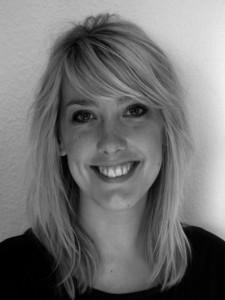 Maja Janmyr is a researcher at the Faculty of Law at the University of Bergen. Her research focuses on public international law; the interplay between international human rights-, humanitarian-, and refugee law; law and anthropology; international legal method; critical human rights; and socio-legal approaches. Read more about Maja Janmyr here:
Maja Janmyr is a researcher at the Faculty of Law at the University of Bergen. Her research focuses on public international law; the interplay between international human rights-, humanitarian-, and refugee law; law and anthropology; international legal method; critical human rights; and socio-legal approaches. Read more about Maja Janmyr here:
Read more about the Centre on law and social transformation here: www.lawandsocialtransformation.no
Plural policing and the safety–security nexus in urban governance
Based on a study of policy frames in urban politics in Sweden, Malmö in particular, this article discusses the safety–security nexus in urban governance. It argues that perceived safety figures as an index of order and integration, and security becomes part and parcel of an expanded cohesion agenda which chain-links criminal justice, immigration control and civic integration. The expanded cohesion agenda in urban governance involves plural urban policing enabled by partnership agreements between the police and local authorities. The article demonstrates how force-based, pre-emptive crime-fighting is intertwined with preventative empowerment programmes; the ‘will to power’ is embedded in ‘the will to empower’. The preferred solution to social problems is extended force-based policing in combination with more police involvement in ‘social’ governance. It is argued that the expanded social cohesion agenda works to ‘criminalize’ specific subpopulations by replacing ‘social’ welfare politics with crime prevention programmes. Under an expanded cohesion agenda, crime prevention has less to do with preventing people from violating the law and more to do with securing the social order. Moreover, it is argued that security politics relates to a broader urban politics aimed at nurturing prosperous diversity considered to benefit the city as a whole, at the cost of problematic difference. In conclusion the article argues that urban security politics lends itself to old welfare state structures, even as responsibility for social crime prevention is devolved ‘downwards’ and distributed across and array of agencies. The social democratic legacy – the revised welfare state – seems to offer favorable conditions for plural policing of minority groups in the city.
 Randi Gressgård is professor at the Centre for Women’s and Gender Research (SKOK), and affiliated with the research unit International Migration and Ethnic Relations (IMER), University of Bergen. Her research interests include migration & minority studies, gender & sexuality studies and urban studies. Among her recent publications are Multicultural Dialogue: Dilemmas, Paradoxes, Conflicts (New York and Oxford: Berghahn Books, 2010/2012) and ‘The power of (re)attachment in urban strategy: Interrogating the framing of social sustainability in Malmö’ (Environment and Planning A 2014, vol. 46).
Randi Gressgård is professor at the Centre for Women’s and Gender Research (SKOK), and affiliated with the research unit International Migration and Ethnic Relations (IMER), University of Bergen. Her research interests include migration & minority studies, gender & sexuality studies and urban studies. Among her recent publications are Multicultural Dialogue: Dilemmas, Paradoxes, Conflicts (New York and Oxford: Berghahn Books, 2010/2012) and ‘The power of (re)attachment in urban strategy: Interrogating the framing of social sustainability in Malmö’ (Environment and Planning A 2014, vol. 46).
IMER Lunch: Astrid Ouahyb Sundsbø – Social mixing policies: What You Want and What You Get
In the public debate and contemporary social policies in Norway as well as in other countries, concentrations of “immigrants” in certain areas of a city are considered to be unfortunate and something which needs to be fought against (see i.e. Gakkestad 2003; Akerhaug 2012). It is anticipated that spatial concentrations of “immigrants” enforces the social isolation of “immigrants” and triggers criminal activities, among other aspects. This becomes very obvious when a “high percentage of immigrants” in an area serves as basis for referring to that area as a “ghetto” or “insecure” (see i.e. Sæter 2005; Vassenden: 2007; cf. Akerhaug 2012).
In this lunch seminar, the idea of social mixing, which is not just common in the general public debate but also a manifested major urban policy and planning goal (Sæter & Ruud 2005; Huse, Sæter & Aniksdal 2010; cf. Musterd 2005) will be discussed. By using some illustrations both from the academic debate as well as own empirical work, it is shown that it is necessary to be critical about this concept.
It is referred to literature arguing that there is a lack of empirical evidence showing that the residential segregation of “immigrants” has any effect at all, for instance on “integration” and crime (for instance Musterd 2005; Galster 2007; Lees 2008). Furthermore, it is discussed that the imagination of social mixing as an ideal way to tackle the “multicultural challenge” might be founded on a highly problematic understanding of “immigrants“ and their norms and values as inherently “bad” (cf. Eriksen 1996: 51). This is shown by drawing on statements from interviews with members from the majority population residing in Oslo.
Astrid Ouahyb Sundsbø
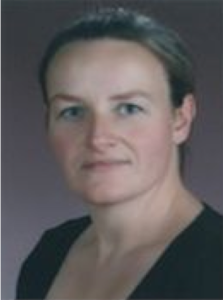 Astrid Ouahyb Sundsbø (PhD) is a postdoctoral research fellow at the Georg-Simmel Center for Metropolitan Studies in Berlin. She holds a doctoral degree in sociology from the Humboldt-University of Berlin (2012). From 2012-2014 she worked as a postdoctoral researcher at the Center for a Sustainable University at the University of Hamburg. Her main fields of research compromise: Social inequality, residential segregation in cities, migration and interethnic relations. Her most recent publication is Grenzziehungen in der Stadt. Ethnische Kategorien und die Wahrnehmung und Bewertung von Wohnorten (Springer VS, 2014) where it is discussed whether ethnic boundary making on the side of the majority population could be a possible explanation for the residential concentration of immigrants in Berlin and Oslo.
Astrid Ouahyb Sundsbø (PhD) is a postdoctoral research fellow at the Georg-Simmel Center for Metropolitan Studies in Berlin. She holds a doctoral degree in sociology from the Humboldt-University of Berlin (2012). From 2012-2014 she worked as a postdoctoral researcher at the Center for a Sustainable University at the University of Hamburg. Her main fields of research compromise: Social inequality, residential segregation in cities, migration and interethnic relations. Her most recent publication is Grenzziehungen in der Stadt. Ethnische Kategorien und die Wahrnehmung und Bewertung von Wohnorten (Springer VS, 2014) where it is discussed whether ethnic boundary making on the side of the majority population could be a possible explanation for the residential concentration of immigrants in Berlin and Oslo.
Sara Kohne: The experience of change in culturally diverse urban areas. Examples from two districts in Berlin and Oslo.
During the last two decades, central inner city areas have constantly become more attractive to the middle class as places for living and leisure. It is especially because of their history and cultural diversity that these urban districts gain ”new” popularity. This development is, among other things, connected to larger processes of economic and societal change, such as globalisation and de-industrialisation, and it is often called gentrification – a process of urban transformation that results in the physical, sociocultural and economic upgrading of city districts.
In taking a qualitative oriented approach on two culturally diverse urban areas that are partly experiencing the process which has just been described, Kohne´s aim is to identify challenges and assets that are experienced by the residents living and working in such districts.
In her presentation, Kohne will present selected findings from her work with the areas Kreuzberg SO36 in Berlin and Grønland-Tøyen in Oslo. She will discuss them in a comparative context.
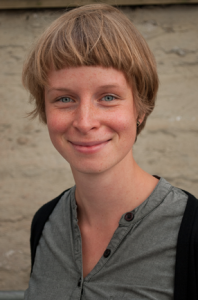 Sara Kohne is a PhD candidate in the discipline of Cultural Studies at the Department of Archaeology, History, Cultural Studies and Religion at the University of Bergen. Her research interests lie within the areas of cultural understandings of place, processes of change, and inequality in urban contexts.
Sara Kohne is a PhD candidate in the discipline of Cultural Studies at the Department of Archaeology, History, Cultural Studies and Religion at the University of Bergen. Her research interests lie within the areas of cultural understandings of place, processes of change, and inequality in urban contexts.
Active citizenship in culturally and religiously diverse societies.
In debates on citizenship in Europe, the need for active participation among citizens is increasingly stressed. But do normative ideas of what active citizenship is, reflect people’s lived experiences in present-day Europe? While the low electoral participation of young people is often highlighted as an indication of reduced civic participation, various studies show increased social media use leads to increased political and social debates and mobilization. And while politicians often lament the lack of civil-political engagement among immigrants particularly, many new citizens volunteer, work as activists, take up political causes, or set up associations in both their countries of residence and origin. In Europe’s culturally and religiously diverse societies, citizens have different frameworks for how they act and interact with their close and distant surroundings. The ACT project studies this diversified citizen participation through empirical data collection on (local, national and transnational) active citizenship in neighbourhoods in Oslo and Copenhagen.
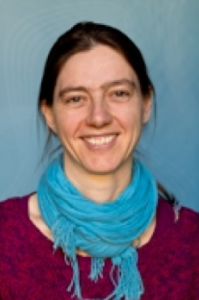 Cindy Horst is Research Director and Research Professor in Migration and Refugee Studies at the Peace Research Institute Oslo (PRIO). Her current research interests include: mobility in conflict; diaspora; humanitarianism; refugee protection; (transnational) civic engagement; and theorizing on social transformation.
Cindy Horst is Research Director and Research Professor in Migration and Refugee Studies at the Peace Research Institute Oslo (PRIO). Her current research interests include: mobility in conflict; diaspora; humanitarianism; refugee protection; (transnational) civic engagement; and theorizing on social transformation.
The Play of Colors: Staging Multiculturalism in Norway
Fargespill (lit. “play of colors”) is a series of musical performances in Norway that have been staged from 2004 to the present. Each performance consists of a sequence of musical and dance numbers performed by children from different minority and immigrant groups, many of whom came to Norway as refugees, together with white Norwegian children. The songs and choreographies represent the home countries of the children who perform, and have included for example music and dance from Somalia, Myanmar (Burma), Rwanda, Kurdistan, and Eritrea, combined together with Norwegian folk music in often elaborate production numbers with colorful costumes and complex musical arrangements. While the specific musical numbers used and cast members change from performance to performance, the concept remains the same – a representation of ethnic, racial and cultural diversity in Norway staged through the voices and bodies of the children on stage. From its beginnings as an cultural initiative in the city of Bergen, Fargespill has gained increasing national attention within Norway, leading to performances in other cities such as Oslo and Trondheim.
Using as a starting point recent theorizations of multiculturalism and critical discussions of race and racism in Norway, this paper analyzes the Fargespill performances. The paper also uses Deleuze and Guattari’s twin concepts of majoritarian/minoritarian to interpret Fargespill’s representations. While the public face of Fargespill is that of children of various immigrant and minority groups, behind the scenes the performances are actually conceptualized, scripted, and extensively stage-managed primarily by majority (white) Norwegian adult arts professionals. The paper especially explores the question of whether the representations of Fargespill constitute a positive contribution to creating a climate for embracing difference in Norway, or whether Fargespill is better understood as a reassuring story white Norwegians tell themselves about multicultural Norway that, at best, naively sidesteps ongoing problems of racism and intolerance toward minorities and immigrants endemic in contemporary Norwegian society. Fargespill’s use of the performing bodies of refugee children to tell its story about a supposed Norwegian multicultural utopia can be seen as especially problematic in the context of the Norwegian government’s recent practices regarding the forced return of long-dwelling child asylum seekers to their country of origin.
 Thomas Solomon is Professor in the Grieg Academy-Department of Music at the University of Bergen. He has previously taught at New York University, University of Minnesota, and Istanbul Technical University. He has done field research in highland Bolivia on musical imaginations of ecology, place and identity, and in Istanbul on place and identity in Turkish hip-hop. His publications include articles in the journals Ethnomusicology, Popular Music, European Journal of Cultural Studies, and Yearbook for Traditional Music, as well numerous chapters in edited volumes on topics such as music and indigeneity in highland Bolivia, orientalism and gender in Turkish popular music, music and postcolonialism, and music and race in American cartoons. He is also editor of Music and Identity in Norway and Beyond: Essays Commemorating Edvard Grieg the Humanist (2011) and African Musics in Context: Institutions, Culture, Identity (2015), and co-editor of Ethnomusicology in East Africa: Perspectives from Uganda and Beyond (2012).
Thomas Solomon is Professor in the Grieg Academy-Department of Music at the University of Bergen. He has previously taught at New York University, University of Minnesota, and Istanbul Technical University. He has done field research in highland Bolivia on musical imaginations of ecology, place and identity, and in Istanbul on place and identity in Turkish hip-hop. His publications include articles in the journals Ethnomusicology, Popular Music, European Journal of Cultural Studies, and Yearbook for Traditional Music, as well numerous chapters in edited volumes on topics such as music and indigeneity in highland Bolivia, orientalism and gender in Turkish popular music, music and postcolonialism, and music and race in American cartoons. He is also editor of Music and Identity in Norway and Beyond: Essays Commemorating Edvard Grieg the Humanist (2011) and African Musics in Context: Institutions, Culture, Identity (2015), and co-editor of Ethnomusicology in East Africa: Perspectives from Uganda and Beyond (2012).
A light lunch, coffe and tea will be served.
Download poster here: Thomas Solomon on the play of colors (pdf)

